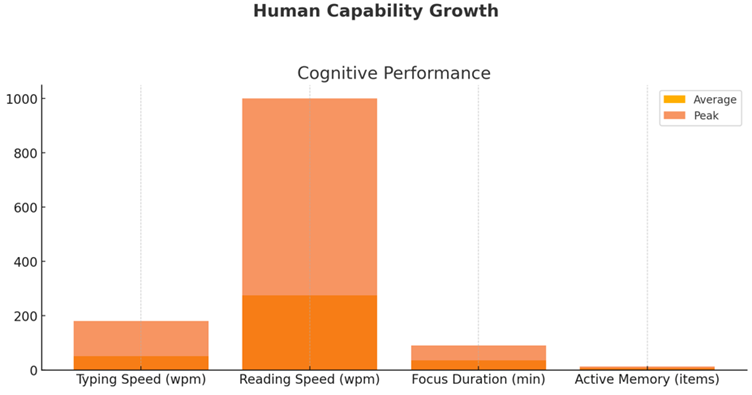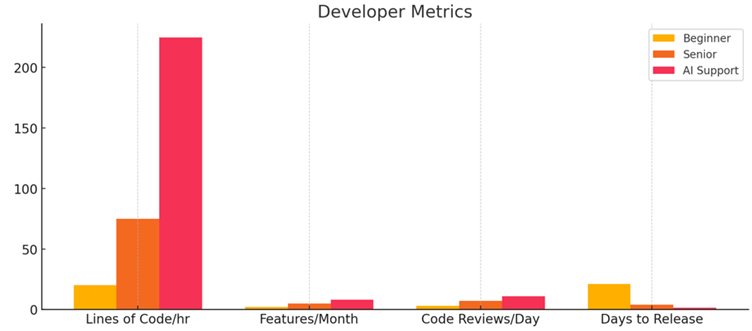
We live in a world obsessed with measuring productivity. And while artificial intelligence is often praised for speed and volume, there’s one competitor that’s still very much in the game: us.
What happens when we measure a specialist not just by their role, but by what they can truly achieve? Let’s take a closer look.
Read also:
Soft2Bet: history and platform evolution.
Here is a line graph showing how a person’s performance on various measures can increase over time.

Cognitive Performance:
Typing Speed: from 50 to 180 words per minute
Reading Speed: from 275 to 1000 words per minute
Focus Duration: from 35 to 90 minutes
Active Memory: from 7 to 12+ items

Developer Metrics:
Lines of Code/hour: from 20 (beginner) to 225 with AI support
Features/Month: growth from 2 to 8+
Code Reviews/Day: from 3 to 11
Days to Release: reduction from 21 days to 1.5
Untapped Human Capacity
The charts illustrate the impressive potential for growth in human abilities given the right training, tools, and environment.
Typing and reading speeds can increase 3–4 times, opening new horizons for information processing.
Focus duration can be stretched nearly 2.5 times — from 35 to 90 minutes — which is crucial for deep work.
Active memory expands from 7 to 12+ items, enhancing multitasking and decision-making.
These growth patterns show that cognitive abilities are not fixed traits but resources that can be developed. Efficiency depends on environment, habits, technology, and health. Humans are flexible systems with tremendous potential for scaling.
The Soft Power of People
Some things simply can’t be measured by charts or code: Emotional intelligence, Conflict resolution, Intuition in ambiguity, Motivating others, Building trust.
These are domains where humans don’t just compete—they define the field.
Why It All Matters

The space between doing okay and doing brilliantly is wider than we think—and more reachable than we assume. The ability to improve isn’t just a feature of high performers. It’s part of being human.
Learning to type faster, code more efficiently, or lead with greater empathy isn’t locked behind talent. It’s unlocked by effort, curiosity, and support.
Learning at the Speed of Thought
People aren’t born experts. A complete beginner can go from zero to writing usable code in weeks with the right structure and tools. Unlike machines, humans don’t need hard rules to adapt—they learn from context, outcomes, and meaning.
Rest Is a Feature, Not a Flaw
AI might never sleep, but people are at their best when they do. Short breaks, naps, and moments of quiet aren’t inefficiencies—they’re vital tools for problem-solving, memory, and focus. Pausing doesn’t delay progress; it powers it.
Failure as a Force Multiplier
A mistyped line of code. A missed goal. A miscommunication occurred during a meeting. These aren’t dead ends—they’re pivots. The brain rewires after mistakes, forming stronger connections for the future. Each stumble becomes a step in a better direction.
You, Rewritten
You’re not a cog in a machine. You’re the engine.
With every habit formed and every challenge overcome, you’re not just moving forward – you’re evolving. Growth isn’t downloaded. It’s trained, tested, and earned.
And if anyone tells you human limits are set in stone, show them what happens when you choose to stretch.
